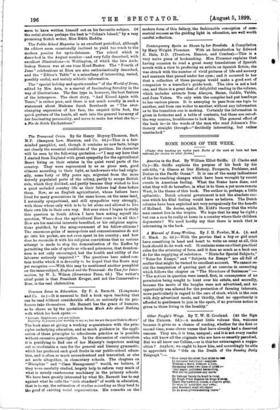Common Sense in Education. By P. A. Barnett. (Longmans and
Co. 6s.)—It is unusual to find a book upon teaching that can be read without considerable effort, so seriously do its pro- fessors take themselves. Mr. Barnett has the grace of humour, as he shows us by the quotation from Much Ado about Nothing with which his book opens e Leonid°. Neighbours, you are tedious.
Dogberry. It pleases your worship to say so, but we are the poor Duke's officers."
The book aims at giving a working acquaintance with the prin- ciples underlying education, and as much guidance in the appli- cation of these principles to schoolroom practice as is possible without excessive prescription. In the discussion of curriculum it is gratifying to find one of her Majesty's inspectors making out so irrefutable a case for the general and literary gymnastic, which has produced such good fruits in our public-school educa- tion, and is often so much misunderstood and travestied, or else set aside altogether, in elementary schools. The chapters on "Discipline " and " Class Management" would, we believe, if they were carefully studied, largely help to reform very much of what is merely cumbersome machinery in the primary schools. We have been greatly interested by what Mr. Barnett has to say against what he calls the "civic standard" of worth in education, that is to say, the estimation of studies according as they tend to the good of existing social organisations. His remarks on the modern form of this fallacy, the fashionable conception of eon'. meecial success as the guiding light in education, are well worth careful reflection.


































 Previous page
Previous page